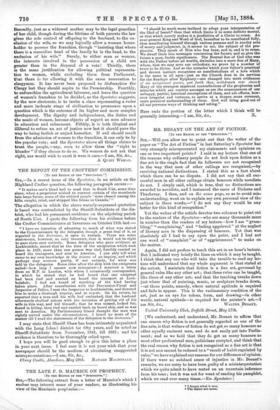[To THE EDITOR. OF THE " SPECTATOR-1 you allow me,
as one of a large and, as yet, unrepre- sented class, to remark on certain points in your article opposing Mr. Woodall's Amendment ? At the last general election, the question of extending the franchise to women wag brought before the great majority of candidates, most of whom declared themselves distinctly on the subject, and were returned with the full prospect of its being discussed during the tenure of the new Parliament. It is, therefore, as needless to dissolve upon this question as it would have been when, earlier in the Session, the very important Act was passed enabling married women to be the legal possessors of their own property.
Secondly, just as a widowed mother may be the legal guardian of her child, though during the lifetime of both parents the law gives the sole control of offspring to the husband, to the ex- clusion of the wife, so we may logically allow a woman house- holder to possess the franchise, though "insisting that where there is a masculine head of the family he is the head, to the
• exclusion of his wife." Surely, to either man or woman, the interests involved in the possession of a child are greater than in the disposal of a vote ! Thirdly, there is the same justification for allowing political representa- tion to women, while excluding them from Parliament, that there is for allowing it with the same reservation to clergymen. It has never been proposed to disfranchise the Clergy lest they should aspire to the Premiership. Fourthly, to enfranchise the agricultural labourer, and leave the question of women's franchise to be decided, as the Spectator suggests, by the new electorate, is to invite a class representing a ruder and more inchoate stage of civilisation to pronounce upon a question which is the outcome of its higher and more complex development. The dignity and independence, the duties and the needs of women, become objects of regard as men advance in education and refinement. Fifthly, it is both illogical and illiberal to refuse an act of justice now lest it should pave the way to being foolish or unjust hereafter. If evil should result from the admission of women to the franchise, it can only be by the popular vote ; and the Spectator above all things claims to trust the people,—nay, even to allow them the "right to blunder" if they choose to do so. We women do not ask that right, nor would wish to exert it were it ours.—I am, Sir, &c., A QUIET WOMAN.



































 Previous page
Previous page